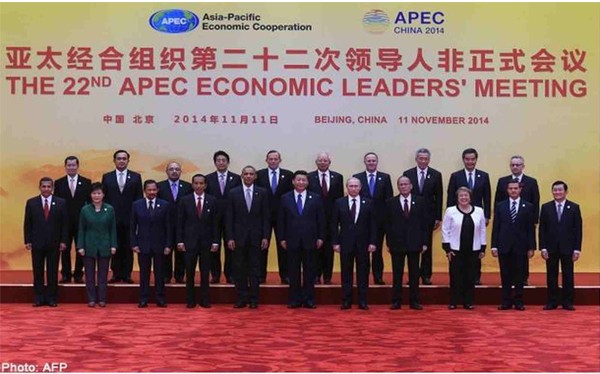Leaders of the 21 APEC member countries agreed on Tuesday to start work on the Free Trade Area of the Asia-Pacific (FTAAP) framework for advancing regional integration.
The 11th item in their 68-point 2014 Leaders' Declaration (Beijing Agenda for an Integrated, Innovative and Interconnected Asia-Pacific) in part states: "We agree that APEC should make more important and meaningful contributions as an incubator to translate the Free Trade Area of the Asia-Pacific (FTAAP) from a vision to reality.
"We reaffirm our commitment to the eventual FTAAP as a major instrument to further APEC's regional economic integration agenda," it said further.
The leaders will launch a collective strategic study on issues related to the realization of the FTAAP, and instruct their respective officials to undertake the study, consult stakeholders and report the results by the end of 2016.
Chinese President Xi Jinping praised the agreement to support FTAAP as a show of APEC's will to advance regional integration, especially since that the Trans-Pacific Partnership (TPP) trade negotiation has now stalled because of disagreements between the U.S. and Japan over agricultural tariffs.
The U.S.-initiated TPP is a narrower agreement involving just 12 countries--China not among them--requiring each to open even some of its most fiercely protected markets to foreign goods and services to maximize the purported benefits of free trade.
The Beijing FTAAP Roadmap is seen as a more modest, more realistic alternative to TPP.
In his speech before the APEC leaders, Xi said that the FTAAP does not go against existing free trade arrangements. In fact, it can be viewed as the aggregate of existing free trade arrangements, a framework to consolidate regional integration and define long-term goals.
Tang Guoqiang, president of China's National Committee for Pacific Economic Cooperation, said that China's goal in pushing for the acceptance of FTAAP is to "counter the growing trend of fragmentation in the region that directly undermines economic integration, not the TPP or any other specific free trade agreement."
Xi also announced Tuesday that China will contribute $10 million to APEC to support its "institutional development and capacity building" and provide 1,500 training positions to developing members of APEC to enhance their trade and investment.
He added: "We need to expand financial and technological support to the developing members so that we can take advantage of the diversified and complementary roles of each member to achieve common growth in the region."



























